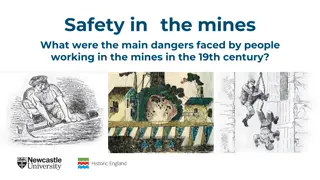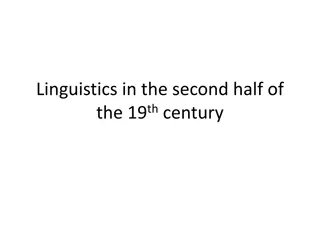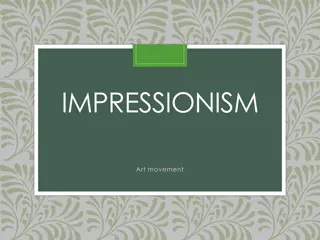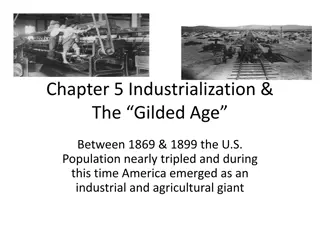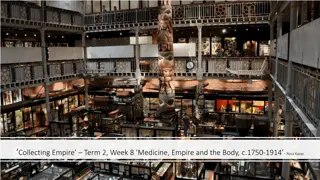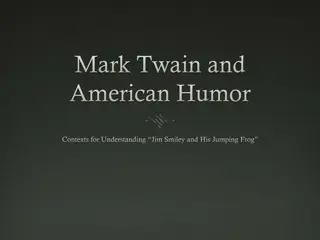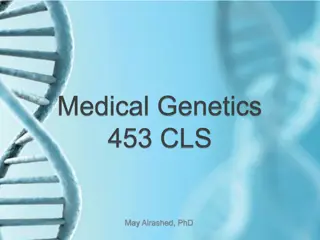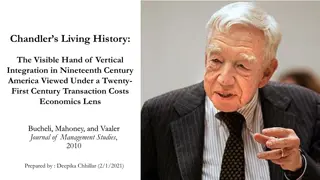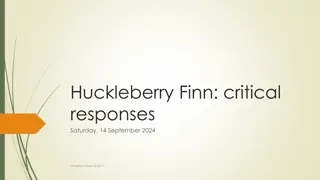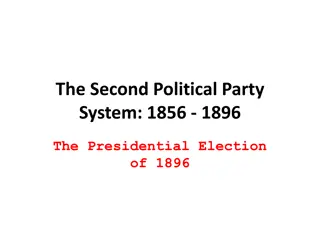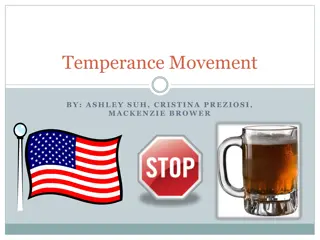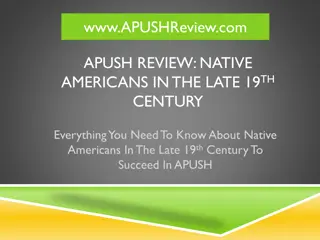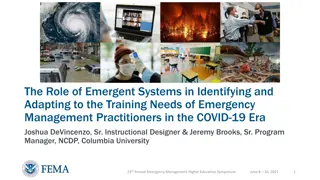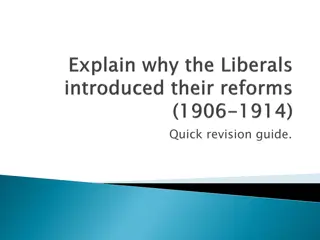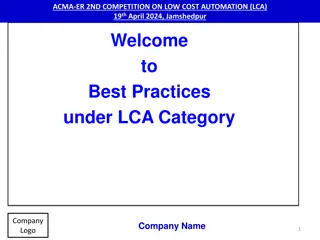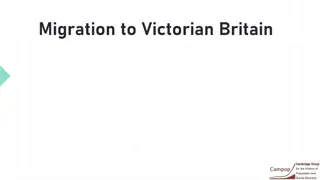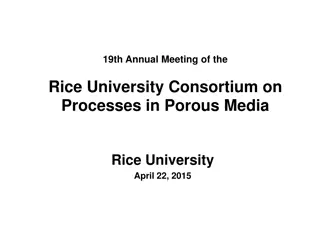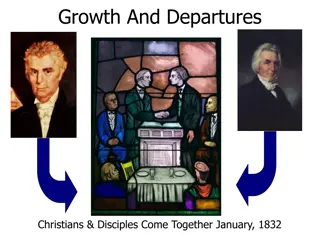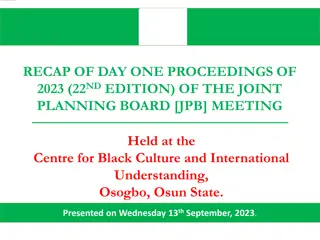Context Setting for the 22nd JPB Meeting
Gain insight into the background, aims, and successes of the JPB/NCDP meetings, highlighting the significance of the upcoming 22nd edition hosted in Osun State. Explore the collaborative efforts, policy decisions, and key stakeholders involved in this annual event promoting economic management and p
0 views • 12 slides
Summary of 21st JPB/NCDP Meeting on Good Governance and Sustainable Development
The 21st edition of the Joint Planning Board (JPB) meeting focused on Good Governance and Institutional Capacity for Sustainable National Development. Held in Ebonyi State, the meeting featured technical discussions and policy proposals to enhance Nigeria's economic management. With sessions on stre
0 views • 10 slides
Reform Efforts in the Ottoman Empire: 18th and 19th Century Transformations
The Ottoman Empire underwent a series of reforms from the late 18th to the 19th century, aiming to centralize power, boost revenues, strengthen the military, educate bureaucrats, refine legal systems, and improve healthcare. Factors driving these reforms included military weaknesses, separatist nati
0 views • 19 slides
Dangers Faced by Miners in 19th Century Mines
Mines in the 19th century were perilous workplaces with dangers such as flooding, getting trapped, poor ventilation leading to health issues, explosions from fire-damp, and the risk of being crushed. Tragic incidents like the Huskar pit disaster in 1838 and the New Hartley Colliery disaster in 1862
2 views • 9 slides
Linguistics in the Second Half of the 19th Century: Schleicher, Psycholinguistics, Neogrammarian Theories
August Schleicher's biological approach to language, including his Stammbaumtheorie, aligned with Darwinian ideas prevalent in the 19th century. The origins of psycholinguistics can be traced back to Heymann Steinthal, who advanced the psychology of language. This period saw critical developments in
4 views • 22 slides
Lost and Found: 19th Century Finnish Literature Exploration
Exploring the 19th-century Finnish literature through archives, bibliographies, and digital methods. Efforts to improve metadata, discover new knowledge about authors and works, and reconstruct the literary system disrupted by historical events like the Great Fire of Turku.
1 views • 12 slides
Understanding Impressionism: Art Movement in the 19th Century
Impressionism emerged in the mid-19th century as a reaction against traditional French art standards. This art movement focused on capturing the essence of a subject through short, thick strokes of paint and vibrant colors applied side-by-side. Artists like Claude Monet, Pierre-Auguste Renoir, and o
0 views • 11 slides
Update on Malaria Libre Project Meeting - 19th April 2023
The Malaria Libre Project Meeting held on 19th April 2023 discussed key topics such as the Aryl Imidazole chemical series, potential new series, and the MMV Early Lead Criteria for the next milestone. Chemistry resources appointed by MMV were also outlined, focusing on Aryl Imidazoles as the main ar
0 views • 13 slides
The Impact of Industrialization and the Rise of Big Business in the Late 19th Century
The late 19th century saw significant industrial and economic growth in the United States, leading to the emergence of large corporations that dominated the economy and society. The Industrial Revolution spurred the development of interconnected transportation networks, electric power, and the appli
0 views • 21 slides
Evolution of Feminism Through Charlotte Perkins Gilman & Kate Chopin
First Wave Feminism focused on suffrage and legal rights in the 19th century. It later transitioned into the Second Wave critiquing patriarchal structures, with key figures like Betty Friedan and Gloria Steinem. Third-Wave Feminism emerged in the early 1990s addressing workplace harassment and power
6 views • 23 slides
Anthropological Collections and Display Practices in the 19th Century
Explore the practices of collecting and displaying anthropological artifacts in the 19th century, focusing on figures like Pitt Rivers and themes such as craniology, typological organization, and the construction of difference among human groups. The readings provide insights into how museums and ex
0 views • 5 slides
Mark Twain and American Humor: Exploring Southwestern Humor and 19th-century Jokes
Delve into the roots of American humor through the works of Mark Twain, examining Southwestern humor from 1830-1860 characterized by tall tales and dialect humor. Discover the wit of women humorists like Frances Whicher and Marietta Holley. Explore humor forms like anecdotes, hoaxes, and frame tales
0 views • 17 slides
Evolutionary Contributions of Prominent Scientists in the 19th Century
Charles Darwin, Gregor Mendel, Friedrich Miescher, Aristotle, and Carl Linnaeus were key figures in the 19th century who made significant contributions to the fields of evolution, genetics, DNA discovery, and taxonomy. Darwin proposed the theory of evolution and natural selection, Mendel established
0 views • 20 slides
Insights into Vertical Integration in 19th Century America Through Transaction Cost Economics
Exploring Alfred Chandler's work and its application in understanding the evolution of business organizations in the 19th and early 20th centuries in America. The article applies transaction cost theory to explain historical shifts towards vertical integration, emphasizing the cost-efficiency of int
2 views • 16 slides
ADOT&PF Civil Rights Office 19th Annual DBE & Subcontractors Conference: Preparing & Positioning for Success
The ADOT&PF Civil Rights Office is hosting the 19th Annual DBE & Subcontractors Conference, focusing on preparing and positioning attendees for success. Featuring presentations by Ryan Wilson, Civil Rights Program Manager at FHWA, Alaska Division, this event aims to provide valuable insights and str
0 views • 4 slides
Supporters of Slavery in the 19th Century: Legal, Religious, and Economic Arguments
In the 19th century, defenders of slavery utilized legal arguments by denying citizenship rights to blacks, religious arguments by justifying ownership and guidance through biblical references, and economic arguments by comparing treatment of slaves in the South to conditions of workers in the North
0 views • 4 slides
Reception and Criticism of "Huckleberry Finn" in the 19th Century
Huckleberry Finn" faced a mix of reception in the 19th century, with some areas praising it while others criticized its language, humor, and moral tone. The book was banned in Concord but gained popularity in other regions, with critics highlighting its depiction of Southern life along the Mississip
0 views • 17 slides
Economic Transformations in Latin America during the Late 19th Century
The late 19th century in Latin America marked a period of significant economic changes driven by a global context that included events like the Great Depression of 1873-1896 and the second industrial revolution. Core capitalist powers sought cheap raw materials, labor, and new markets, leading to in
1 views • 17 slides
European Colonial Encounters 1750-1914: Paths to Imperialism
Second wave European conquests in the 18th and 19th centuries saw a shift towards informal control and military force in establishing empires in Africa and Asia. Various paths to colonial status emerged in India, Indonesia, Australia, and New Zealand, reflecting different colonization methods and ou
0 views • 21 slides
Political Landscape and Elections in the Late 19th Century
The political scene in the late 19th century in the United States was marked by the rise of the Second Party System, leading up to the pivotal Presidential Election of 1896. The Congressional elections of the era reflected shifts in power between Democrats, Republicans, and various opposition groups
0 views • 12 slides
Contrasting Perspectives of America in the 19th Century
The content delves into the societal, economic, and political disparities between the North and South of America in the mid-19th century, highlighting differences in literacy rates, economy, agricultural practices, and labor systems. While the regions shared a common history and political system, th
0 views • 36 slides
Unification of Italy in the 19th Century: Risorgimento Movement
The Unification of Italy in the 19th Century was driven by the Risorgimento nationalist movement, led by figures like Giuseppe Mazzini, Camillo Benso di Cavour, and Giuseppe Garibaldi. Cavour, as Chief Minister of Sardinia, played a crucial role in reorganizing the army and forming alliances to defe
1 views • 25 slides
The Temperance Movement in 19th Century America
The Temperance Movement emerged in the early 19th century in America, advocating for abstinence from alcohol due to its detrimental effects on health, families, and society. Led by figures like Lyman Beecher and Amelia Bloomer, the movement saw a decline in alcohol consumption, the implementation of
0 views • 8 slides
Insights into Italian Foreign Policy and Economy in the 19th Century
This content delves into the history of Italian foreign policy and trading policies between 1860 and 1960, focusing on the perceptions of Italy from abroad, the pre-unitarian inheritance of the Kingdom of Two Sicilies, and the societal and economic landscape of Naples and Sicily during the 19th cent
0 views • 30 slides
Native Americans in the Late 19th Century: APUSH Review
Explore the systematic relocation, conflicts, and cultural assimilation of Native Americans during the late 19th century in America. From the Indian Removal Act to the Dawes Act, witness the impact of government policies on Native tribes, culminating in tragic events like the Sioux Wars and Wounded
0 views • 8 slides
Women and Philanthropy in the 19th Century: A Historical Perspective
This content explores the historiographical trends, gender dynamics, and the role of female philanthropists in the 19th century. It delves into how women engaged in charitable activities, challenging societal norms and contributing to the construction of women's identities through philanthropy. The
0 views • 23 slides
Emergent Systems for Training Needs in COVID-19 Era
Explore how emergent systems can identify and adapt to the training needs of emergency management practitioners during the COVID-19 era. The symposium delves into analyzing feedback from pandemic-era trainings, aligning emergent themes with national preparedness assessments, and offering recommendat
0 views • 11 slides
Welfare Reforms in the 19th Century: A Historical Overview
In the 19th century, poverty was often blamed on individuals, leading to a laissez-faire approach by the government. Key figures like Charles Booth and Seebohm Rowntree conducted insightful studies on poverty, highlighting the need for welfare reforms. The emergence of genuine concern for the poor a
0 views • 8 slides
ACMA-ER 2nd Competition on Low-Cost Automation (LCA) - 19th April 2024, Jamshedpur
The ACMA-ER 2nd Competition on Low-Cost Automation (LCA) will be held on 19th April 2024 in Jamshedpur. Participants will showcase innovative practices under the LCA category focusing on themes such as safety, quality improvement, cost reduction, and productivity enhancement. The competition aims to
0 views • 18 slides
The Second Great Awakening: Revival and Transformation in 19th Century America
The Second Great Awakening was a significant religious movement in 19th century America, marked by fervent revivals led by influential preachers like James McGready and Charles Finney. Emphasizing sin, repentance, and spiritual renewal, this period witnessed a resurgence of evangelical Christianity
0 views • 14 slides
Migration Trends in Victorian Britain
Overseas migration to Victorian Britain was relatively low in the 19th and early 20th centuries, with Irish, German, and Italian migrants being prominent. The Irish migration was driven by famine, with many settling in areas like Liverpool for work. German migrants contributed to various professions
0 views • 14 slides
National Confederation of Disabled People (NCDP) Initiatives for Disability Inclusion and Accessibility
The National Confederation of Disabled People (NCDP) plays a crucial role in promoting disability rights and accessibility in Greece by actively engaging in the implementation of European Structural and Investment Funds. Through their involvement in policy development, training initiatives, and advo
0 views • 9 slides
US Overseas Expansion in the Late 19th & Early 20th Centuries: Key Concepts & Movements
Explore the reasons behind US overseas expansion in the late 19th and early 20th centuries, including economic opportunities, racial theories, competition with European empires, and the perception that the frontier was closed. Delve into key events, figures, and debates such as the annexation of Haw
0 views • 12 slides
19th Annual Meeting of the Rice University Consortium on Processes in Porous Media
The 19th Annual Meeting of the Rice University Consortium on Processes in Porous Media held on April 22, 2015, brought together a prestigious group of consortium members, faculty, collaborators, staff, visiting scientists, post-docs, Ph.D. students, undergraduate students, and distinguished Ph.D. gr
0 views • 20 slides
Evolution of State Banking in 19th Century America
American economic development in the 19th century was driven by the abundance of resources and the necessity for capital-intensive projects. The expansion of the economy, adoption of technology, and integration into a national economy required a robust financial system with financial intermediaries
0 views • 19 slides
Historical Evolution of the Christian Church in the 19th Century
In the 19th century, the Christian church underwent significant changes and developments, encompassing growth, unity efforts, leadership transitions, and challenges such as the impact of the Civil War. Key events include the dissemination of the Disciples' Hymn Book, establishment of colleges, the i
0 views • 16 slides
Recap of Day One Proceedings of 2023 JPB Meeting in Osogbo, Osun State
The 22nd Edition of the Joint Planning Board Meeting was held in Osogbo, Osun State, focusing on restoring Nigeria's economic growth. The meeting started with key addresses and presentations on energy sufficiency and sustainable development. Delegates from various sectors participated in this hybrid
0 views • 9 slides
U.S. Expansion and Foreign Policy in the Early 19th Century
The U.S. focused on increasing foreign trade, expanding its borders, and isolating itself from European conflicts during the early 19th century. Key events such as the Louisiana Purchase, annexation of Texas, and treaties with China shaped U.S. foreign policy. Debates over slavery, territorial expan
0 views • 7 slides
Status of Implementation of Resolutions from 19th JPB/NCDP Meeting by Dr. Mrs. Gloria Ahmed
The 19th edition of the Joint Planning Board meeting was held in March 2021 to discuss national development planning in Nigeria. Dr. Mrs. Gloria Ahmed, the Ag. Director of Special Duties, led the agenda. A total of 26 key resolutions were made, and states were tasked with tracking their implementati
0 views • 14 slides
Exploration of EAP Practitioners' Views on Implementing Critical Social Justice Texts
An in-depth look into how EAP practitioners perceive the integration of critical, social justice texts in the EAP curriculum. The debate surrounding the political nature of EAP, recent discussions, and session overviews in educational contexts are explored, with a focus on a specific talk by JPB Ger
0 views • 12 slides



